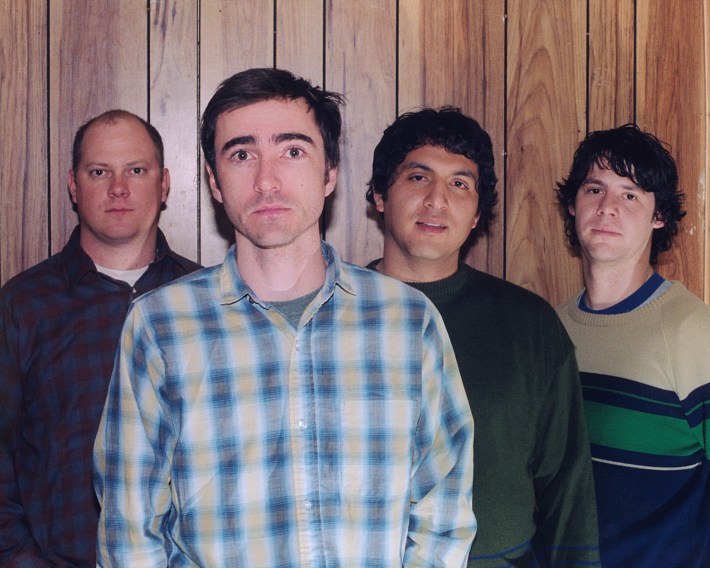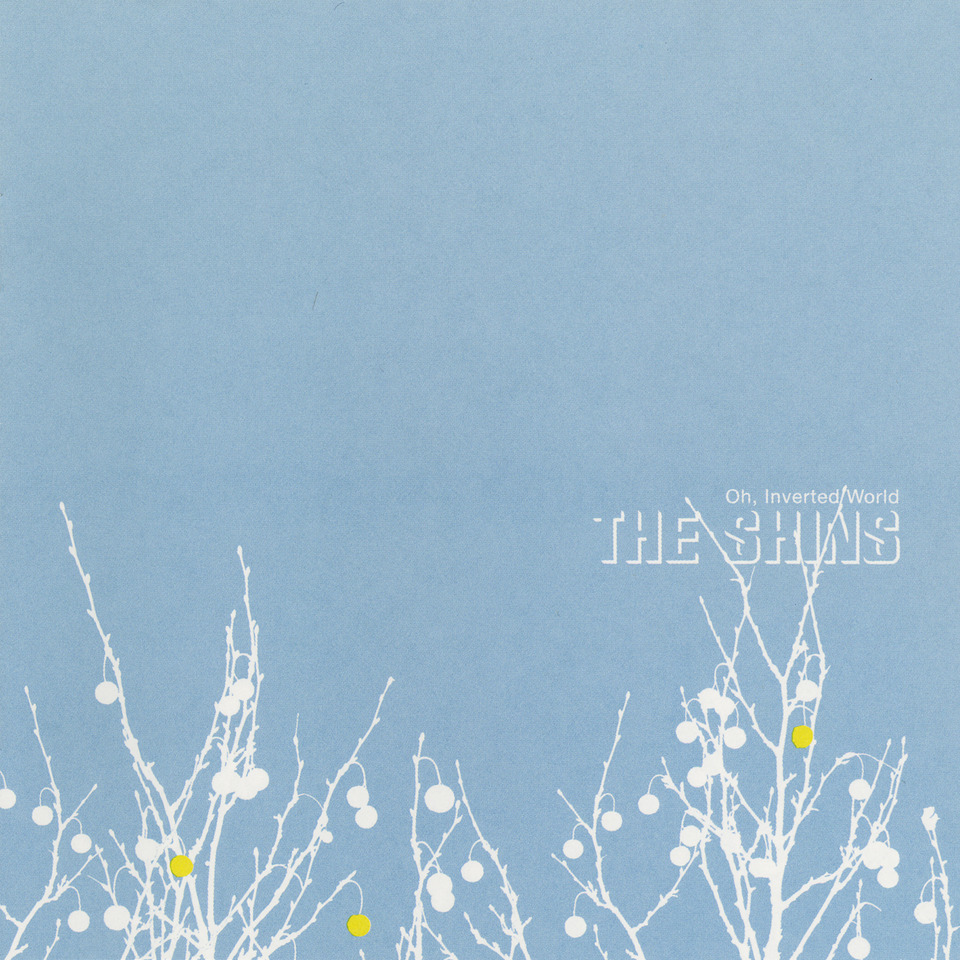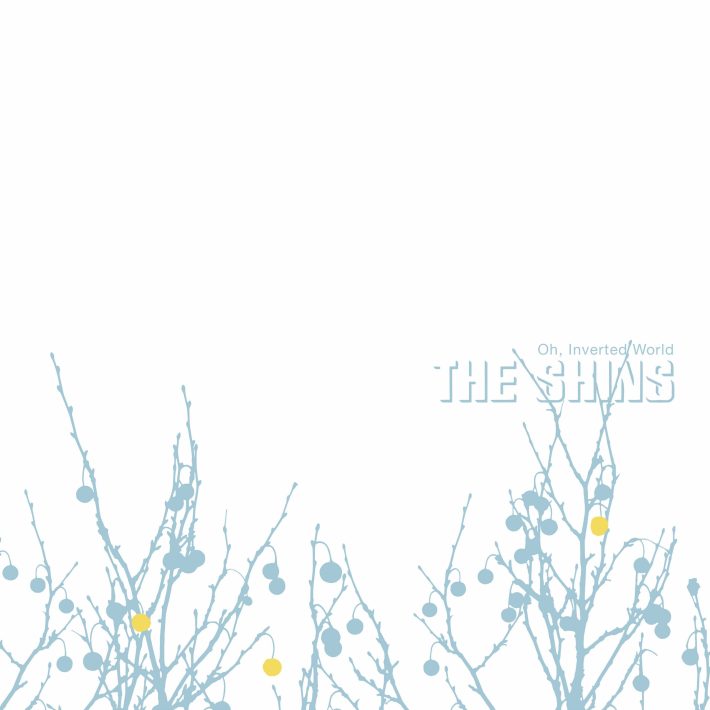- Sub Pop
- 2001
"You gotta hear this one song, it'll change your life I swear." Radiating the kind of giddy flirtatious energy that would come to define the manic pixie dream girl trope, Natalie Portman glides across the waiting room and puts her headphones over Zach Braff's ears. Soon, his face locked into a contemplative expression, he's watching Portman slip in and out of an awkward smile while listening to the Shins' wistful acoustic ballad "New Slang." After about 25 seconds of this painful staring contest, he takes off the headphones and renders a verdict: "It's good. I like it." He clearly is much more interested in the girl than the song.
Braff's understated response is only natural. Muted in tone and modest in scope, "New Slang" is not what you expect to hear when you've just been told a song will change your life. It's pretty, but it doesn't exactly bash you over the head. In general the Shins were not likely candidates to upend someone's whole existence: four gawky-looking guys, from a midsize Southwestern city not known for its music scene, making unassuming guitar-pop tunes with words like "celibate" and "algebra" in the titles. And yet Portman's claim in that infamous scene from Garden State did not seem that much like hyperbole to me. As dopey as it sounds, the Shins kind of did change my life.

By the time Garden State hit theaters on Aug. 20, 2004, there were a whole lot of people out there who felt similarly. The Albuquerque combo spent the prior half-decade slowly building up a reputation as one of the most beloved new bands in indie rock, purveyors of relentlessly catchy guitar-pop songs that managed to be punchy and subtle at the same time. At the center of that buildup was their debut album Oh, Inverted World, released 20 years ago this Saturday. In no small part thanks to "New Slang" -- its centerpiece, lead single, and eventual McDonald's-ad cash cow (never mind all that "dirt in your fries") -- Oh, Inverted World generated so much buzz that its 2003 follow-up Chutes Too Narrow posted Sub Pop's best first-week figures to date. They were doing well for themselves even before Hollywood came calling.
The band's origins reach all the way back to 1992, when future Shins founders James Mercer, Jesse Sandoval, Martin Crandall, and Neal Langford started a band called Flake with Phil Higgs. Flake released their debut single a year later on Albuquerque label Resin Records and within a few years were touring with the likes of Califone and Modest Mouse when they could get time off from their day jobs. (Mercer operated amusement park rides, among other gigs.) By 1997, having adjusted their name to Flake Music, the group released their lone full-length album When You Land Here, It's Time To Return on Omnibus Records out of Sacramento, who also put out Mates Of State's debut three years later. Opening track "Spanway Hits" reveals that the signature Shins sound was already fully formed, though they weren't consistently deploying it; the rest of the album often finds Mercer and friends in thrall to Built To Spill, Pavement, and other underground titans of the moment. It is very much a '90s indie rock album and very worth hearing if you've ever enjoyed Mercer's work.
Around the time the Flake Music LP came out, Mercer started a side project called the Shins. The idea was to try something different, but over the next couple years, the Shins basically morphed into a new incarnation of Flake Music, with essentially the same membership and more or less the same sound. When a friend pointed out to Mercer how much his early Shins recordings sounded like Flake Music, he sought to differentiate the bands by making the Shins his personal songwriting vehicle (in contrast to Flake's collaborative approach) and pursuing a simpler, gentler, lightly psychedelic sound with a distinctly beachy tint. By 1999, Flake Music was over. Soon indie rock movers and shakers like Modest Mouse's Isaac Brock were hounding Sub Pop Records about signing this humble guitar-pop band out of New Mexico. Zeke Howard from Love As Laughter even hand-delivered the Shins' demo to Sub Pop's office. It wasn't just the in-crowd buzzing about the Shins; the burned CDs that Mercer would hand out after shows made their way to Napster, where they were downloaded more than 30,000 times. A deal to release "New Slang" through the Sub Pop Singles Club soon evolved into plans for a full-length album.
Oh, Inverted World was an important record for Sub Pop, helping to rejuvenate and redefine a label that had been suffering an identity crisis since grunge's heyday. ("It’s hard to overstate how impactful that record was," Sub Pop General Manager Chris Jacobs explains in the liner notes of the label's new Oh, Inverted World reissue. "It gave the label contemporary relevance beyond grunge.") For similar reasons, the album became important for underground music as a whole. Along with future Sub Pop acts like Iron & Wine, Band Of Horses, and the Postal Service -- not to mention Ben Gibbard's main band, who preceded the Shins' big Garden State moment with an endorsement from teen tastemaker Seth Cohen -- the Shins' debut ushered in a tamer, more approachable form of big-ticket indie rock that left much of the genre's rangy, rambunctious energy in the 20th century. Upon its release the album drew comparisons to the Elephant 6 collective's nouveau psych-pop, and Mercer acknowledged the influence of E6 bands like the Apples In Stereo. But it more closely resembled E6's most basic source material, iconic '60s pop-rockers like the Beatles, the Kinks, and (especially) the Beach Boys.
Despite the Shins' desert origins, every song on Oh, Inverted World sounds like it's taking place along a breezy coastline. Given Crandall's dreamy array of keyboard sounds and the reverb haze inherent to Mercer's home recordings, maybe think of it as a mirage. The vibe extends to quieter tracks like the quirky ballads "Weird Divide" and "Your Algebra" and the deeply melancholy finale "The Past And Pending," but it comes through most clearly on the spunky rock songs that comprise the bulk of the tracklist. Sandoval's tom-heavy drumming lends a riptide effect to "One By One All Day" and "The Celibate Life." The syncopated guitar stabs on "Know Your Onion!" and "Girl On The Wing" hit like volleyballs being set and spiked. They were still an album away from the explosiveness of "So Says I" and "Kissing The Lipless," but for such a homespun album, there was a lot of rhythmic action powering these songs. Sometimes you could even say the Shins were rocking out.
Yet Mercer's melodies were the main draw, and not just the wordless coo that drifts through "New Slang" like a grownup lullaby. Starting with the arching topline that kicks off "Caring Is Creepy," the guy shows off a prodigious knack for hooks, particularly ones that jut upward to the top of his range. Sometimes, as on "Girl Inform Me," his voice feels delicate and mannered. Other times, as on "Pressed In A Book," he sounds like a scrappy underdog howling his lungs out. Looking back, Mercer's yelps and sighs evoke a less manic Spencer Krug, another Brock favorite who would one day bring back some bite to the Sub Pop catalog via Wolf Parade's own classic debut. But if Krug often sound otherworldly and unhinged, Mercer is unmistakably human.
This, I think, was central to the Shins' appeal for introverts like me, the people who (for better or worse) saw themselves reflected back in the geeky protagonists of Garden State and The O.C. I might have spent entire weeks of middle school in my basement practicing Metallica solos, but I never expected to become Kirk Hammett. I might have grown my hair out into a wavy poof senior year because of the Strokes, but I never believed I could be Julian Casablancas. Even Pavement, perennially slipshod and disheveled, had an untouchable swagger I could not imagine replicating myself. These bands were larger-than-life and impossibly cool. The Shins were attainable -- schlubs like me who happened to write timeless pop songs, obscuring their feelings about breakups and the loss of childhood innocence in turns of phrase vague enough to let you project your own meaning on the music.
This smallness may also be why, at first, Oh, Inverted World didn't blow me away, and why I can relate with the Braff character's initial indifference as much as Portman's evangelistic fervor. On first pass this seemed like average music by average dudes, but I'd read enough rave reviews that I kept listening. And then one day, while jogging across my university campus with my portable CD player, it all clicked. I was mesmerized. Within months I was writing fake Shins songs in my dorm room and had started a column in my college newspaper called Inverted World. They became a core artist for me, a band I'd eagerly share with friends long before the movie made it a cliché. The qualities that made Oh, Inverted World so winsome -- the personal touch, the undefinable magic, that sense of finding glimpses of yourself in somebody else's faded photographs -- they all started to diminish with each successive Shins album. But for a while there, this band really did turn my world upside down.







